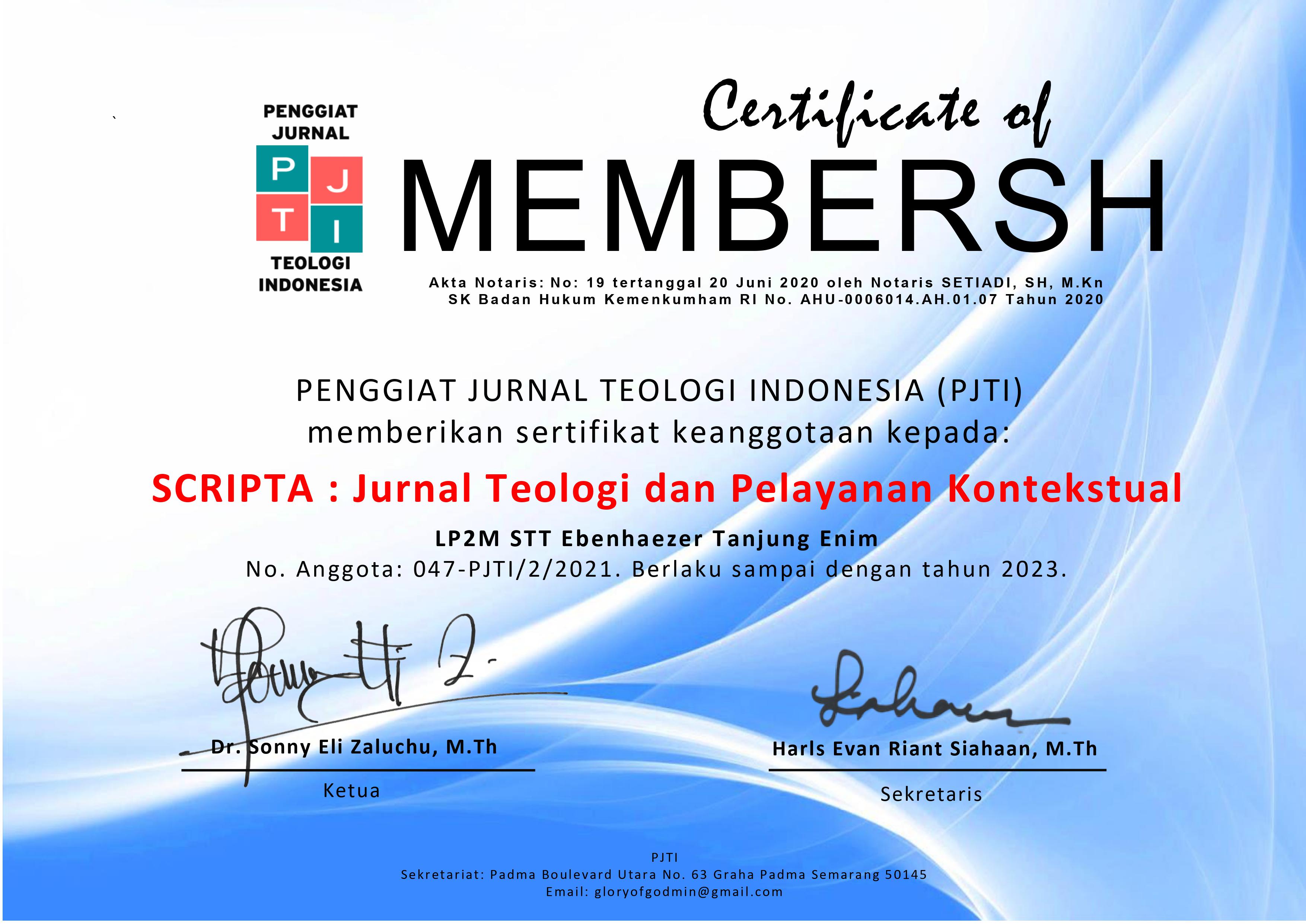Sabat dan Pandemic Covid 19 Perspektif Eco-teologi Kristen
DOI:
https://doi.org/10.47154/scripta.v9i1.110Keywords:
Eco-Teologi, Sabat, Pandemic, Covid 19Abstract
Masalah lingkungan hidup kini mendapat perhatian serius. Karena itu teolog Kristen berusaha membuat ataupun merevitalisasi doktrin tentang lingkungan hidup. Di saat pandemic covid 19, sepertinya kualitas lingkungan hidup meningkat karena manusia “beristirahat” akibat wabah yang terjadi. Di dalam Alkitab hari Sabat dan tahun Sabat dirancang Allah sedemikian rupa untuk mengatur istirahat manusia dan istirahat lahan (lingkungan) dari aktivitas di atasnya. Pada tulisan ini diulas hubungan Sabat dalam Alkitab dengan pandemic covid 19 yang menyebabkan berhentinya aktivitas manusia. Metode yang digunakan adalah metode penelitian teologi filosofika dengan didahului tafsir secara eksegesis. Hasil penelitian ditemukan bahwa ada kesamaan antara Sabat dalam Alkitab dengan pandemic covid 19. Kesamaan bukan secara substansial tetapi pada efek yang muncul akibat kedua hal ini.
ABSTRACT
_______________________________________________________________
Environmental problems are now receiving serious attention. Therefore Christian theologians try to create or revitalize doctrines about it. At the time of the COVID 19 pandemic, it seemed that the quality of the environment improved because people were "resting" due to the plague. In the Bible, the Sabbath was designed by God in such a way to regulate human rest and land rest (environment) from the activities above it. In this paper, a review of the Bible's Sabbath relationship with the COVID 19 pandemic caused human activity to cease. The method used is a philosophical theology research method with an exegetical interpretation preceded. The results of the study found there is a similarity between Sabbath in the Bible with the COVID 19 pandemic. That similarity is not substantial but on the effects that arise due to these two things.
References
Kwara, Timothy. 2014. “Relating Biblical Environmental Stewardship with the Melanesian Cultural Concept of Inseparability and Interrelatedness of Humankind and Nature”, Melanesian Journal of Theology 30-2 : 43.
Browning, George Victor. 2014. “Sabbath and the Common Good, An Anglican Response to the Environmental Crisis”, Thesis for the degree of Doctor of Philosophy, Charles Sturt University, 208.
Bergsma, John Sietze. 2007. The Jubilee from Leviticus to Qumran, A History of Interpretation. Leiden, The Netherlands: Brill NV Incorporates, 85.
Nalunnakkal, George Mathew. 1999. Green Liberation towards an Integral Eco-Theology. Delhi: ISPCK, 159.
Robinson. Gnana. 1998. The Origin and Development of the Old Testament Sabbath: A Comprehensive Exegetical Approach. Delhi: ISPCK and UTC, 343-345.
Perumalla, Praveen P. S. 2010. “Towards Symbiosis: The institute of Sabbath Holy Code from Ecological Perspective,” Green Gospel, ed. Thomas Samuel and Mathew Koshy Punnackad. Tiruvalla: CSS, 81.
Georgekutty, K. B. 2000. “Creation Account: A Paradigm for an Integral Ecology,” Faith Theological Review IV/1 September: 22.
Frey, Mathilde. 2011. “The Sabbath in the Pentateuch: an Exegetical and Theological Study”, Dissertations, Andrews University, 302. From https://digitalcommons.andrews.edu/dissertations.
Zambrano-Monserrate, M.A. et al. 2020. “Indirect effects of COVID-19 on the environment”. Science of the Total Environment 728 :138813.
Kerimray, Aiymgul et al. 2020. “Assessing air quality changes in large cities during COVID-19 lockdowns: The impacts of traffic-free urban conditions in Almaty, Kazakhstan”, Science of the Total Environment 730 : 139179.
Austin, Richard Cartwright. 1991. “Biblical Roots for Environmental Ethics”, Sunstone.
Published
How to Cite
Issue
Section
Copyright (c) 2020 SCRIPTA: Jurnal Teologi dan Pelayanan Kontekstual

This work is licensed under a Creative Commons Attribution-ShareAlike 4.0 International License.

SCRIPTURA: Jurnal Teologi dan Pelayanan Kontekstual is licensed under a Creative Commons Attribution-ShareAlike 4.0 International License.


















